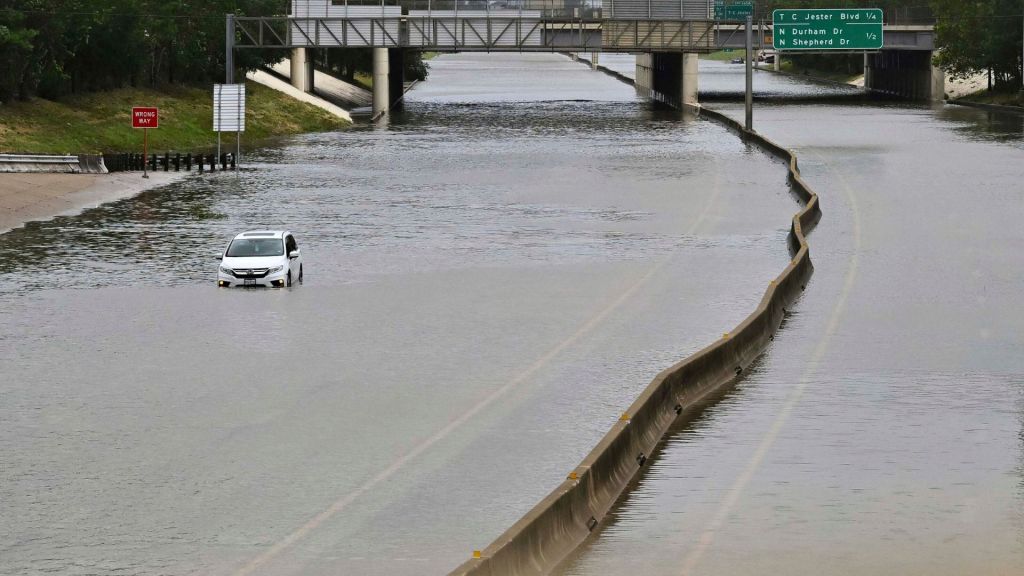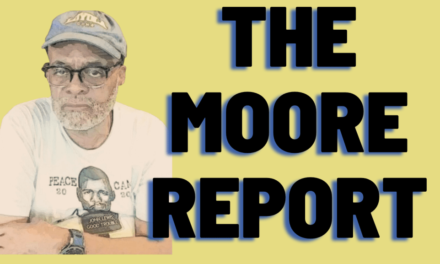By Frank Dexter Brown
Local, national and global efforts embrace climate adaptation and mitigation policies to make societies more resilient and economically viable in a rapidly changing world.

photo: AP Photo/Maria Lysaker
The dangers of severe weather events have hit home in recent months: In mid- to late-June, massive floods from historic, record torrential downpours overflowed riverbanks throughout the Midwest from South Dakota and the Big Sioux River, to Iowa to the striking images of Minnesota’s Blue Earth River pouring over the sides of the century-old Rapidan Dam. The downpours were soon followed by a heat dome that spread across much of the United States resulting in heat events of more than 100 degrees from California to Florida, Texas to Illinois, Oregon to Maine. And then in early July, at the start of hurricane season, came hurricane/tropical storm Beryl with winds rarely experienced so early in the summer. The city of Houston was completely underwater in sections as roads were transferred to rivers and streams and the city looked as if it had been swallowed by nearby Gulf of Mexico waters. Millions were left for days without electricity, in particular air conditioning, during extreme heat days of more than 100 degrees Fahrenheit. These weather conditions all are evidence of the unfolding climate crisis.
Of course, the U.S. was not the only country afflicted. Similar weather conditions were experienced globally. Consider that Beryl, before winding down to the tropical storm that flooded Houston, was a Category 4 hurricane that decimated parts of the Caribbean — Jamaica, especially the parish of St. Elizabeth, was damaged extensively; Curacao, St. Vincent and the Grenadines, saw almost complete infrastructure devastation and Barbados saw the decimation of its fishing industry with the loss of more than 20 fishing boats. In the Amazon, mostly Brazil, but also affecting Peru, Bolivia and Colombia, wildfires that continued from March to May blazed a deadly trail. Then consider the more than 1,300 people who died while making the pilgrimage to the Holy City of Mecca in Saudi Arabia. And on the African continent, there was turmoil throughout 2024, especially East African nations Ethiopia, Somalia, Kenya, Tanzania and Burundi, where hundreds of lives were lost and at least 1.6 million people affected by flooding from seasonal monsoons and cyclones —as a result, now in July, more than 48 million people are estimated to be facing food insecurity due to the devastation from these spring storms.
Meanwhile, scientists and others are warning: yes things are bad and becoming more troubling, but without immediate and aggressive human intervention worldwide, the worst is yet to come.
It’s noteworthy that it has long been understood that local, regional and national governments all have a powerful role to play in the global climate response. Increasingly, this includes putting local and regional adaptation policies into action to foster climate resilience — policies that support reducing greenhouse gas emissions, that alter land-use regulations and decision-making, emphasize smart growth, natural resource conservation and green infrastructure. These policies foster safer, more equitable economic decision-making among the world’s wealthiest nations, and offer protections against extreme weather events for the world’s most vulnerable communities and peoples. This was a focal point of the 196 nations that adopted the Paris Agreement in 2015 at the United Nations Framework Conference on Climate Change (UNFCCC—COP 21) in Paris, France.
For instance, Article seven, paragraph two, of the Paris Agreement, reads: “Adaptation is a global challenge faced by all with local, subnational, national, regional and international dimensions, and that it is a key component of and makes a contribution to the long-term global response to climate change to protect people, livelihoods and ecosystems, taking into account the urgent and immediate needs of those developing country Parties that are particularly vulnerable to the adverse effects of climate change.”
Transformative change: Pursuing a just transition to an equitable world.
The protections of the Earth’s most vulnerable — both wildlife and human — is a significant aspect of the Paris Agreement’s call for a “just transition” to a more resilient, more equitable world. Such adaptation policies and principles also serve as economic initiatives.
The term just transition, which incorporates environmental justice and climate justice principles, is vital to understanding how the world will survive the expanding climate catastrophe. In brief: Global South nations, people of color, and in general the world’s least-wealthy citizens (including communities of color in the Global North), who have been among the world’s lowest-impact polluters — annually and historically — are disproportionately affected by the dangers of the increase in fossil fuel emissions. They are bearing, and will continue to bear, the brunt of weather-related repercussions, if behavioral change is not forthcoming.
Wealthy nations, after decades of debate and refusal to limit fossil fuel use, today recognize that to reduce global emissions, they must prioritize commitments to those suffering the most. This includes climate-related “green financing” must be provided for “loss and damage” among nations of the Global South (and increasingly similar arguments are made for communities of color in the Global North).
This funding could be used by entrepreneurs of color to build cooling centers and for tree-planting to extended leaf coverage to address extreme heat conditions; warming centers for extreme winters; urban farms (including rooftop as some cities have established) in food desert areas lacking fresh foods and vegetables; and for establishing independent energy microgrids for more dependable community electrical power. All of these efforts can assist in reducing carbon emissions and adapt neighborhoods to be more efficient and resilient.
If such technologies and financial resources are shared broadly and equitably, this will bring the world closer to successfully addressing climate change, while offering economic opportunities. Communities can be revitalized. Nations rebuilt. Peoples and their ecosystems—lands, forests, and water resources—saved and made them more productive. Economies are made more prosperous by transitioning from fossil fuels to renewable energy. Millions of new jobs globally can be tied to this activity — all of which should be connected to safer, cleaner and more sustainable lifestyles.
But these funds must come through grants and not loans. Because of debt-trap impediments, often tied to the vestiges of settler colonialism globally (and economic redlining in the U.S. These nations have argued for debt cancellation of loans received from the World Bank, the International Monetary Fund (IMF), and other financial institutions. This is part of pushing for climate justice.
This revisioning, according to many researchers, climate activists, and government officials, is why the worldwide call for a just transition has gained resonance. Wealthy states, corporations and financial institutions are obligated to respond, activists, nongovernmental organizations (NGOs) and others say, especially since the world’s 20 richest countries are responsible for three-fourths of all worldwide CO2 emissions. But wealthy states have been slow in following through on their promises, as green financing, renewable product technology transfers, and debt cancellation have not been fully implemented.
Throughout the world, as climate-related dangers escalate, people are increasingly seeking for these policies to be implemented. In the U.S., statewide and local groups of communities of color and/or lower-income communities, are seeking such protections.
In Maryland, citizens are fortunate to live in a state with a visionary approach to the world’s climate crisis. The Wes Moore government and the state legislature has made following a thoughtful, equitable and comprehensive climate action plan a priority. Similarly, Baltimore Mayor Brandon Scott and the Baltimore city council have focused on how transcendent climate policies are in the best interests of Baltimore citizens.
But even with such progressive governance, people can’t be complacent. During this election year, Republicans and other conservatives, as part of their war on governmental spending, are attempting to crush climate protection initiatives (even though the U.S. has been the world’s largest emitter historically). Note that the Heritage Foundation’s “Mandate for Leadership” 2025 Project, the more than 900-page policy framework for the nation’s right-wing, includes calls for rolling-back climate and other environmental protections, while providing continued support for fossil fuel and other polluting companies and industries. Then consider the Supreme Court’s Chevron doctrine decision announced in early July, which guts the decision-making power of federal agencies such as the Environmental Protection Agency (EPA) and the Occupational Safety and Health Administration (OHSA) to interpret and define regulations and statutes designed to safeguard public health and safety. The Supreme Court conservative majority, and its extremist allies in lower courts nationally, are seeking to limit scientific assessments and impair emergency actions such as those tied to climate, pollution, and the clean air act and clean water act. These forces have sought such power for decades. They must be stopped.
If we want to protect our communities, our children, yes indeed, our future, then we must mobilize and turnout this November, and vote against legislators seeking such policies, including empowering conservative justices who hold such views. Our future in Baltimore, Md., throughout the U.S., and, yes, indeed, the world, is at stake. These extremists must be denied.
Frank Dexter Brown is founder and executive director of the Baobab Diaspora Visions Project, a green, science-based cultural storytelling media platform, featuring reporting and narratives of world voices.
The post A Plan to Save Earth appeared first on AFRO American Newspapers.










